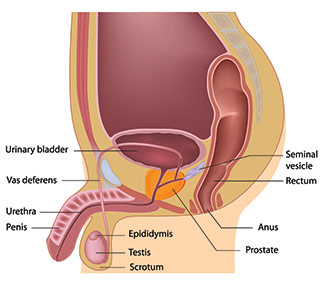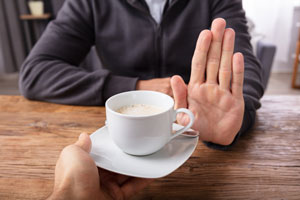In fact, certain conditions such as prostatitis (infection of the prostate) are more common among younger men – so whatever your age, it’s important to be vigilant when it comes to your prostate. About 8 out of 10 men suffer from enlarged prostate problems with 90% of which are over the age of 85. There’s no harm in starting early and preventing prostate problems than looking for treatment options later on.
What Is The Prostate?

The prostate is a tiny walnut shaped gland or organ that's located between the bladder and penis. It’s responsible for releasing semen and also controls the functioning of the penis. Since the prostate also surrounds the urethra which helps pass urine, an increase in its size or an inflammation can squeeze the urethra thereby leading to urination problems.
Different Types Of Prostate Problems
The prostate is an important part of the male reproductive system and is often susceptive to age related problems. It can be as mild as an inflammation and the severe stages may include prostate cancer. The following are common problems associated with men’s prostate health:
Prostatitis
Certain infections can lead to inflammation in the prostate which is called prostatitis. Antibiotics are used to get relief from this condition.
Enlarged Prostate
Benign Prostatic Hypertrophy (BPH) is common among most men as they age. The warning signs of enlarged prostate are noticeable only once you cross 50 years of age or a little earlier in a few cases. The prostate gland starts increasing in size by the time you reach 40 and continues to grow in size if left untreated.
Prostate Cancer
When a malignancy forms in the prostate gland, it could be cancerous. Obesity or being physically inactive can up the risk. A family history of prostate cancer can increase your risk of being diagnosed with it
Symptoms Of Prostate Problems
Recognising that you have a prostate issue can be tricky – some sufferers may not experience any symptoms at all - but there are a few signs to be aware of that may indicate poor prostate health. If you do experience these symptoms, make sure to consult your doctor as soon as possible. If left untreated, these problems can lead to bladder stones, urinary tract infections, and urine retention or kidney damage.
- An excessive need to urinate
- Interrupted night sleep due to frequent urge to urinate at night
- Burning sensation when urinating
- Inability to urinate or frequent episodes of urinary tract infection
- Bladder not completely empty even after urination
- Difficulty in starting to urinate
- Blood in urine ( this condition would need immediate medical attention)
- Pain during ejaculation
Special tip for prostate care: Don't control the urge to pee - empty your bladder by spending extra time to urinate.
Who Suffers From Prostate Problems?

While prostate problems are most common in men over the age of 50, it's important to remember that, contrary to popular belief, this frustrating condition can affect you at any age. Genetics or family history of BPH can also be a reason.
Causes Of Enlarged Prostate
While the exact cause of prostate enlargement isn't known, an increase in the number of cells as you age along with some changes in the male sex hormones can make it grow larger. Other factors may include estrogens, androgens or male hormones, and other cell signalling pathways. Certain types of high blood pressure and migraine medication can also result in an enlarged prostate. Other conditions like erectile dysfunction, obesity, heart diseases or diabetes may also increase the odds.
Natural Remedies For Enlarged Prostate Problems
In the past, prostate problems such as prostatitis and BPH had to be endured – but no longer. Following years of research there are several ways in which you can limit your chances of suffering from prostate problems – simple lifestyle changes can have a major effect, for example limiting your intake of caffeine and alcohol can help, while maintaining a healthy diet of low-fat foods can also limit your susceptibility.
- Practice exercises that strengthen your pelvic floor muscles. Exercise can keep your weight under check which is beneficial for your prostate.
- Limit intake of alcohol or caffeine as they increase the desire to pee and may irritate the bladder.
- Ease your bladder at all times by urinating when you feel the urge. Don't hold urine back.
- Avoid consuming too many fluids around bedtime for better sleep.
- Cold weather can increase the frequency of urination so stay warm.
- Increase heart healthy foods in your diet to control the symptoms of enlarged prostate.
- Sitz baths are also beneficial in reducing the swelling of an enlarged prostate. Simply sit in a hot water tub followed by a cold water tub for 2-3 times in a day. Repeating this a few times each week may help ease pain and discomfort.
- Natural foods that help prostate health include fish like salmon, anchovies, tuna or herring as they're rich in omega-3 fatty acids. Other sources of good fats include nuts, avocados, olives and seeds. Kale, broccoli, cauliflower and cabbage and fruits rich in vitamin C can also be consumed to control prostate problems.
- Processed foods and sugar, spicy foods, caffeine, alcohol, dairy, eggs and poultry and red meats are foods to avoid for good prostate health.

If you adopt these methods of prevention and still find that you’re suffering from prostate issues, ShytoBuy offers a fantastic range of natural products that is unique on the market today.
- Herbal supplements are formulated to help regulate hormones and can work to reduce the size of enlarged prostate.
- Natural supplements are rich in antioxidants and show inflammation reducing properties.
Frequently Asked Questions Regarding Prostate Problems
Can an enlarged prostate cause premature ejaculation?
There's no evidence to establish a direct relation between prostate problems and premature ejaculation. In fact, the causes and symptoms of both the conditions are completely different and hence there is no connection between the two. However, here’s all you need to know about premature ejaculation, its causes, symptoms and treatment.
Can a lack of sex cause prostate problems?
Recent studies have proven that regular sex can help prevent prostate problems. During sex, the prostate secretes semen which also helps flush out cancer-causing chemicals and prevents calcifications in the glands too. Hence regular sexual activity can reduce the risk of prostate cancer.
Does lower back pain in men indicate prostate problems?
The location of the prostate is nearer to your lower back. An enlarged prostate may affect the nerves of your spine thereby causing discomfort in the back. Inflammation of the prostate during prostatitis can lead to pressure on the pelvic region and back pain.
The Final Word
Proper exercise and healthy dietary modifications can balance the hormones in your body as you age and thus help reduce problems associated with an enlarged prostate. It’s important to remember that as well as the discomfort caused by prostate issues, you can find your virility inhibited – conditions such as BPH can make sexual intercourse painful – so if you do recognise early symptoms, you should make sure to combat them as soon as possible. Natural products help provide safe and effective relief from prostate conditions, so whichever treatment you choose, you can be confident of great results with no unwanted side-effects.

